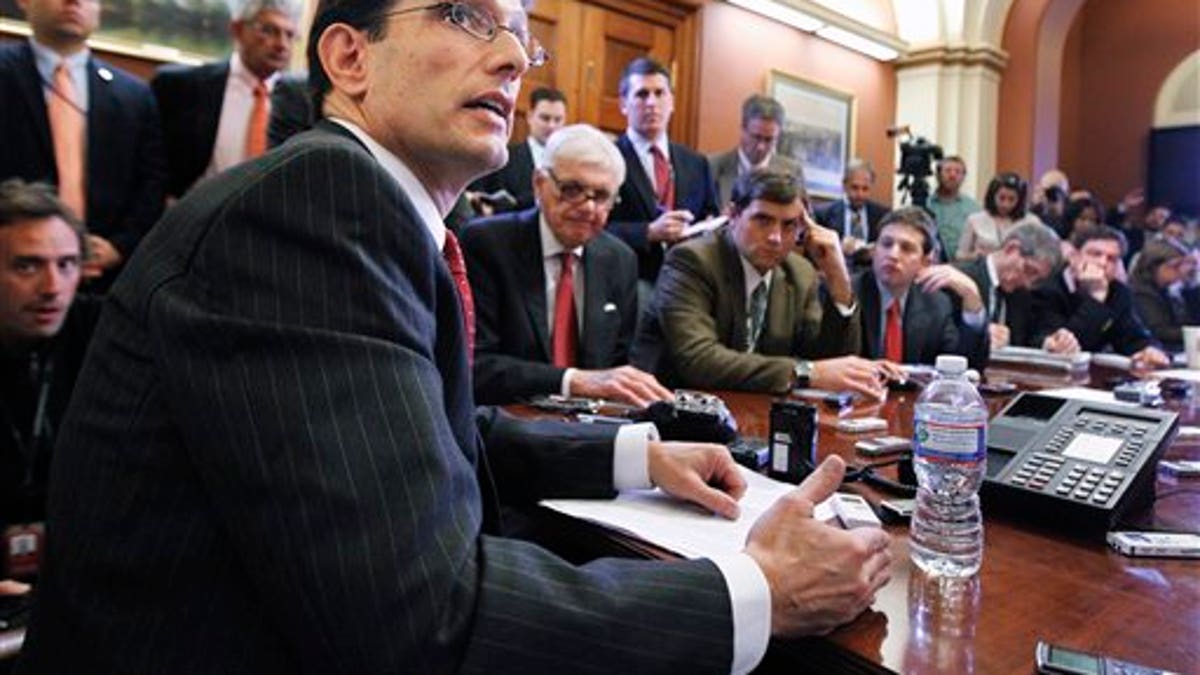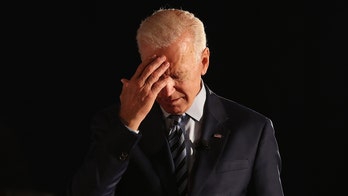
Nov. 14, 2011: House Majority Leader Leader Eric Cantor speaks to the media during a news briefing on Capitol Hill in Washington. (AP)
WASHINGTON – Steep automatic spending cuts are scheduled to occur if a so-called Super Committee in Congress can't get a deal on debt reduction, but that scenario won't happen, the No. 2 Republican in the House said Monday, offering an optimistic tone just nine days before the committee's deadline.
Majority Leader Eric Cantor, R-Va., said he knows the panel is under great pressure to get a deal done to chop $1.2 trillion from the 10-year budget, but he believes its members can succeed by Nov. 23, the day before Thanksgiving.
"I believe they will reach an agreement by the deadline," Cantor told reporters.
The Super Committee is stuck on the trade-off between revenue increases and spending cuts. If it fails to reach a deal, the law that it is operating under requires automatic cuts, called "sequestration," to take effect. That would entail chopping $600 billion from the defense spending budget and another $600 billion from the entitlement programs Medicare and Medicaid.
"I don't think the sequester will be applicable. I'm confident they will get a deal," Cantor said.
Asked how he felt about the progress, Senate Majority Leader Harry Reid said he feels "better this week than last week."
On Sunday, President Obama urged the members to show more flexibility.
"It feels as if people continue to try to stick with their rigid positions rather than solve the problem," he said from Hawaii, where he was attending the Asian-Pacific Economic Cooperation conference.
"There's no magic formula. There are no magic beans that you can toss on the ground and suddenly a bunch of money grows on trees," Obama added. "We got to just go ahead and do the responsible thing."
Cantor would not comment about the step-by-step progress among the panel, which has stonewalled over the ratio of revenues hikes to spending cuts. With nine days remaining, some of the discussion has centered on whether the debt panel will come up with a two-step process that involves tackling spending cuts now and dealing with tax reforms later.
"There could be a two-step process that would hopefully give us pro-growth tax reform. ... Historically this is how we both produce jobs and more revenues for the government," Rep. Jeb Hensarling, the Republican co-chairman of the panel, told CNN on Sunday.
Hensarling suggested that the target level for revenue to come from taxes could be set now and congressional committees could work out the details.
But with the fight remaining over just how much of that revenue can be used for deficit reduction rather than tax rate reduction, liberal activists warned Democrats not to give in on the issue.
"Congress already slashed programs that the middle class relies on by almost $1 trillion this summer," reads an email from MoveOn that urges members to call their lawmakers and tell them that "a deal that agrees to cuts now but taxes later is a nonstarter."
Rep. Louie Gohmert, R-Texas, said with that kind of attitude, there's little chance a deal could be struck.
"I'm afraid there won't be a deal when the Democrats are being instructed not to make one," he said.
But former Sen. Alan Simpson, R-Wyo., who co-chaired a debt commission that sought $4 trillion in debt reduction, said the fault lies on all sides.
"Four of the people on the 12 were on our commission and they voted against it. ... Why would they come on the group of 12 and change their views?" he asked. "If everything goes to hell in a hand basket, you don't do those cuts until 2013. Well, guess what? That's after the general election. The whole thing is wired as a protective device to keep from getting yourself blown out of Congress with your feet first."
Meanwhile, about 100 members of Congress from both parties are urging the panel to go big on the reductions, to the tune of $4 trillion.
"It's hard to be overly optimistic, but you are seeing progress on what is a very hard issue. We're talking about fixing Social Security, Medicare, the tax system. This is not easy stuff," said Maya MacGuineas, president of the Committee for a Responsible Federal Budget.




